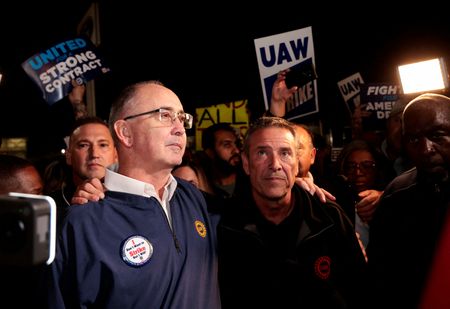By Joseph White and David Shepardson
DETROIT (Reuters) -United Auto Workers leaders approved a tentative deal on Sunday with Ford that includes a pay hike of at least 30% for full-time workers and could more than double pay for others, in a victory for the union’s fight to roll back 15 years of concessions.
Bargaining continued at General Motors without any deal. UAW President Shawn Fain on Saturday ordered a walkout at GM’s Spring Hill, Tennessee, engine and assembly plant. Fain and GM CEO Mary Barra were meeting on Sunday night, sources familiar with the process said.
At Ford, the new deal includes $8.1 billion in manufacturing investments and could give workers up to $70,000 in extra pay over the 4-1/2-year life of the contract.
Cost-saving provisions such as paying workers at component plants less than employees at vehicle assembly lines were swept away under the new contract. The deal also eliminates all lower wage tier plants, an issue Fain highlighted from the start of the bargaining process.
Temporary workers will more than double their pay. Permanent workers could see top wage rates rise by more than 30% to $42.60 per hour by 2028, including estimated cost of living allowances.
In return, Ford will get the opportunity to offer an unlimited number of $50,000 buyouts to older workers earning the top rate. Ford can now replace them with younger hires who will earn less than the top wage for three years. Earlier, it took new workers eight years to reach top wage.
“It is a turning point in the class war that has been raging in this country for the past 40 years,” Fain said on a video post on Sunday.
He credited the rich contract to the union’s strategy of escalating pressure on Ford with a series of targeted strikes over six weeks: “This contract demonstrates the incredible power workers have when they are not afraid to use it.”
The union did back off some of its early demands that included a 32-hour work week, restoring defined benefit pensions and a 40% pay rise over the life of the contract.
Starting with smaller plants, the UAW had expanded the strike to Ford’s profitable Kentucky heavy-duty pickup factory. The union did the same with GM and Chrysler-owner Stellantis, reaching a tentative agreement with the latter on Saturday.
The UAW posted terms of its new contract deal with Ford after talks with local union leaders in Detroit on Sunday, before taking the deal to all union workers for ratification.
TERMS OF DEAL
Ford will add electric vehicles to existing assembly plants in Louisville and Ohio, according to the UAW summary of terms, investing $1.2 billion at the Louisville assembly plant and $2.1 billion to build electric vans in Ohio.
The Ford investments include several new hybrid models, including gas-electric hybrid versions of Ford’s largest SUVs, the Lincoln Navigator and Ford Expedition. Ford CEO Jim Farley has outlined plans to invest more in expanding the automaker’s hybrid lineup, even as it scales back plans to expand capacity for fully electric models.
The UAW won agreements covering new battery plants that could result in thousands of new UAW members at a planned battery plant in Marshall, Michigan, and the Tennessee Electric Vehicle Center, also known as Blue Oval City, that Ford is building in western Tennessee.
Fain said that once unionized, workers at battery plants would earn the same wages as Ford assembly workers.
The UAW-Ford contract offers some of the biggest gains for some of the lowest-paid production workers.
Union leaders will now fan out to regional meetings to explain the deals to members, who will then vote on approving it.
GM WALKOUT
GM and Ford shares have fallen roughly a fifth since the beginning of the strike on Sept. 15. Stellantis shares are down just 1%.
Sources have told Reuters that one key sticking point with GM was retiree pension costs. GM has many more retirees eligible for that increase than either Ford or Stellantis, because its workforce was far larger in the 1980s and 1990s.
Fain on Saturday criticized GM’s management’s “unnecessary and irresponsible refusal to come to a fair agreement.” GM said it was disappointed by the UAW decision to strike Spring Hill.
The Spring Hill walkout could hobble GM’s large pickup production as well as assembly of other popular GM vehicles. Ripple effects from an extended Spring Hill strike could boost the costs of the stalemate for GM well beyond the $400 million a week the company reported last week.
(Reporting by Joe White in Detroit and David Shepardson in Washington and Jyoti Narayan in Bengaluru; Writing by Sayantani Ghosh; Editing by Lisa Shumaker, Diane Craft, Deepa Babington and Jamie Freed)

